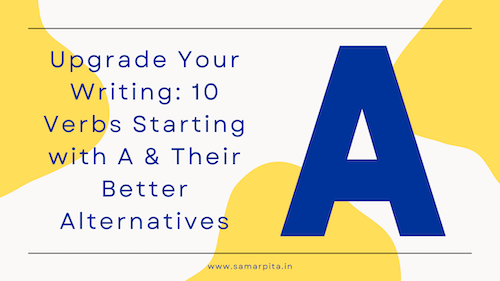Verbs starting with A are plentiful in the English language, and there are always alternative options available to enhance the clarity and precision of your writing. In this chapter, we will explore several common verbs that start with A and suggest some better words you can use instead.
- Accept: While accept is a useful verb, it can be overused in some contexts. Instead, you can consider using words like embrace, acknowledge, or admit.
Example: She embraced the new opportunity with enthusiasm.
Also Read: How Can You Make The Most Of Your Writing Critique Group
- Achieve: Achieve is a great verb for expressing success, but it can sometimes feel vague. Consider using words like accomplish, attain, or succeed.
Example: She succeeded in her goal of climbing Mount Everest.
- Ask: Ask is a straightforward verb that is used frequently, but there are alternatives that can convey a different tone or level of politeness. Try using words like request, inquire, or demand.
Example: He requested a meeting with the CEO.
Also Read: The Benefits of Working with an Editor on Your Manuscript
- Analyze: Analyze is a verb that is commonly used in academic writing, but it can be dry and unengaging. Consider using words like examine, assess, or evaluate.
Example: The researcher evaluated the data for significant trends.
- Assist: While assist is a useful verb for describing help, it can sometimes feel passive. Instead, try using words like aid, support, or facilitate.
Example: The program facilitated her transition back into the workforce.
- Attempt: Attempt is a good verb for describing effort, but it can feel tentative or uncertain. Consider using words like try, endeavor, or strive.
Example: She endeavoured to learn a new language every year.
Also Read: Ensure Consistency in Tone, Tense, and Point of View In a Manuscript
- Admit: Admit is a versatile verb, but it can feel judgmental in some contexts. Try using words like confess, acknowledge, or declare.
Example: He acknowledged his mistake and apologized.
- Appreciate: Appreciate is a common verb for expressing gratitude, but it can feel overused. Try using words like value, cherish, or treasure.
Example: She treasured the memories of her childhood.
- Avoid: Avoid is a good verb for describing actions taken to prevent something negative, but it can feel passive. Try using words like evade, circumvent, or elude.
Example: He evaded the difficult conversation.
- Argue: Argue is a common verb for describing debate or disagreement, but it can feel confrontational. Try using words like discuss, debate, or deliberate.
Example: The group deliberated on the best course of action.
By choosing more precise and engaging verbs, you can make your writing more effective and interesting. Remember to choose words that fit the tone and purpose of your writing.
Read my ebook WRITE. EDIT. PROMOTE. to learn the basics about becoming an author – from writing your own book, to editing your first draft, and to promoting your book yourself! You can also read my ebook How To Write A Story Effectively and learn some valuable lessons about how a story can go from average to extraordinary. This book is part 1 of the series.
In fiction, I have two short stories for children in an ebook called Bedtime Stories.
Follow me on Instagram and Twitter. Send me an email at editor@samarpita.in for editing, content, coaching, or social media planning.


